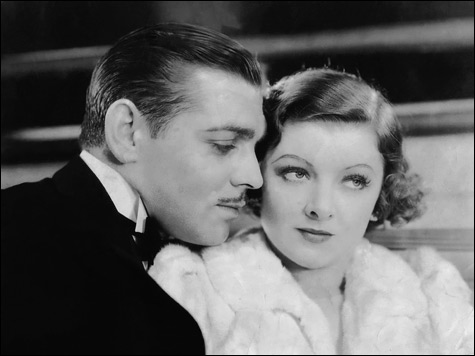
MANHATTAN MELODRAMA:Myrna Loy starts out as Clark Gable's mistress, ends up as William Powell's wife. |
In anticipation of the July 1 release of Michael Mann's Public Enemies with Johnny Depp as John Dillinger, and as part of its week-long "Classic Gangsters" series, the Brattle is screening two rarely seen films this Sunday: John Milius's 1973 Dillinger and W.S. Van Dyke's Manhattan Melodrama, the movie Dillinger went to see at the Biograph in Chicago on July 22, 1934, after which federal agents shot him down outside.
Milius's wasn't Hollywood's earliest attempt to get the '30s' most notorious gangster on screen. A paralytic version came out in 1945 under the same name with the handsome, not terribly expressive Lawrence Tierney as Dillinger. Milius's Dillinger is bad, but it isn't dull: he put a great deal of energy into the shootouts (which are more elaborately staged as the movie proceeds), and the gifted character actor Warren Oates, in one of his few starring roles, brings a much-needed glint of irony to Milius's dialogue. The movie has other bonuses as well. Dillinger's gang includes Harry Dean Stanton and Frank McRae; a very young Richard Dreyfuss shows up as the homicidal maniac Baby Face Nelson (the scene where Dillinger humiliates him into tears is a highlight), and Steve Kanaly plays the irresistibly charming Pretty Boy Floyd. And Jules Brenner's lighting lends an elegiac tone to the wheatfields of the Middle West, even though the endless repetition of "Red River Valley" over the landscapes overstates the point.

Milius is addicted to overstatement; he has a self-conscious, block-lettered style. Like both Bonnie and Clyde five years earlier and Thieves like Us the following year, Dillinger addresses the role celebrity plays in the brief careers of the bank robbers of this lean, desperate era. Both Dillinger and FBI bureau chief Melvin Purvis (Ben Johnson, in an uncharacteristically preening performance) court publicity. Dillinger tells the citizens in every bank he robs that this is one of the defining moments of their lives — a quip that Milius has him address to the camera to implicate us in the gawking, awestruck attitude of the public. Purvis instructs an aide to step up the FBI's publicity machine so that they can steal column inches from the gangsters, and in one attenuated sequence he lets a young boy handle his gun so he'll get a sense of what it's like to be a G-man. It doesn't work: the kid says he'd rather be a robber, which doesn't require schooling.
By contrast, Manhattan Melodrama is a sleek, riveting entertainment with an unusually complex screenplay. (Oliver H.P. Garrett and Joseph L. Mankiewicz get screen credit, along with Arthur Caesar, who won an Oscar for the story, but others worked on it too.) The two protagonists, Blackie Gallagher and Jim Wade, grow up poor on Manhattan's East Side; after being orphaned in the General Slocum boat fire, they're raised by a Jewish neighbor who lost his son the same day. Jim grows into a crusading DA (William Powell), Blackie (played as a child by Mickey Rooney) into a casino owner (Clark Gable) with ties to the underworld. Myrna Loy plays Blackie's mistress, who winds up as Jim's wife. (All three actors are fine, and the contrast of the two male leads works wonderfully.) When Blackie is questioned in a murder, Jim is delighted to let him go for lack of evidence; he's convinced of his friend's innocence. (That conviction is misplaced, of course.) But when Blackie kills the assistant DA, Snow (Thomas Jackson), whose crooked career Jim has cut short, Jim has to prosecute, though the evidence against Blackie is entirely circumstantial.